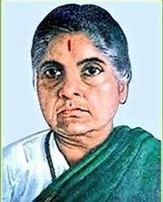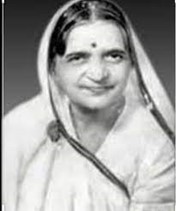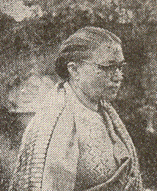PREVIOUS
Women Leaders in Constituent Assembly of India – PART II
May 26 , 2023
329 days
1806
0
(இதன் தமிழ் வடிவத்திற்கு இங்கே சொடுக்கவும்)
4. Durgabai Deshmukh
- Gammiḍidala Durgabāi Deshmukh, Lady Deshmukh was an Indian freedom fighter, lawyer, social worker and politician.
- She was a member of the Constituent Assembly of India and of the Planning Commission of India.
- Durgabāi Deshmukh was born on 15th July 1909.
- From her early years, Durgabai had been associated with Indian politics.
- At age 12 she left school in protest to the imposition of English-medium education.
- She later started the Balika Hindi Paathshala in Rajamundry to promote Hindi education for girls.
- When the Indian National Congress had its conference in her hometown of Kakinada in 1923, she was a volunteer and placed in charge of the Khadi exhibition that was running side by side.
- She was a follower of Mahatma Gandhi in India's struggle for freedom from the British Raj.
- She never wore jewellery or cosmetics, and she was a satyagrahi.
- She was a prominent social reformer who participated in the salt satyagraha activities led by Gandhi.
- She organized women satyagrahis in salt satyagraha.
- This led to British Raj authorities imprisoning her three times between 1930 and 1933.
- After her release from prison, Durgabai continued her studies.
- In 1930, she finished her B.A. and her M.A. in political science from Andhra University.
- In 1930 she went on to obtain her law degree from Madras University.
- She started practicing as an advocate in Madras High Court.
- Durgabai was the president of the Blind Relief Association.
- A public activist for women's emancipation, she founded the Andhra Mahila Sabha (Andhra Women's Conference) in 1937.
- She was also the founder chairperson of the Central Social Welfare Board.
- She was then elected to the Constituent Assembly from the Madras Province.
- She was the only woman in the panel of chairmen in the Constituent Assembly.
- Andhra Education Society (AES) was founded in 1948 by Dr. Durgabai Deshmukh to serve the educational needs of Telugu children residing in Delhi.
- In 1953 she married C.D. Deshmukh.
- C.D. Deshmukh was first Indian governor of the Reserve Bank of India.
- C.D. Deshmukh was Finance Minister in India's Central Cabinet from 1950 to 1956.
- Durgabai was the first chairperson of the National Council on Women's Education, established by the Government of India in 1958.
- In 1963, she was sent to Washington D.C. as a member of the Indian delegation to the World Food Congress.
- She died on 9th May 1981.
- To commemorate her legacy, Andhra University, Visakhapatnam has named its Department of Women Studies as Dr. Durgabai Deshmukh Centre for Women's Studies.
- Durgabhai Deshmukh's received awards are Paul G Hoffman Award, Nehru Literacy Award, UNESCO Award (for outstanding work in the field of literacy), Padma Vibhushan Award, Jeevan Award and Jagadish Award.
- Andhra Makhila Sabha (1938), Social Development Council, Durgabai Deshmukh Hospital (1962), Sri Venkateswara College, New Delhi All the above institutions were founded by Durgabai.

5.Hansa Jivraj Mehta
- Hansa Jivraj Mehta was a reformist, social activist, educator, independence activist, feminist and writer from India.
- Hansa Mehta was born in a Nagar Brahmin family on 3 July 1897.
- She was a daughter of Manubhai Mehta, Dewan of Baroda State, and the granddaughter of Nandshankar Mehta, the author of the first Gujarati novel Karan Ghelo.
- She graduated with Philosophy in 1918.
- She studied journalism and sociology in England.
- In 1918, she met Sarojini Naidu and later Mahatma Gandhi in 1922.
- She was married to Jivraj Narayan Mehta, an eminent physician and administrator who was the first Chief Minister of Gujarat.
- Hansa Mehta organized the picketing of shops selling foreign clothes and liquor.
- Hansa Mehta participated in other freedom movement activities in line with the advice of Mahatma Gandhi.
- Later she established Desh Sevika Dal in 1930.
- She was even arrested and sent to jail by the British along with her husband in 1932.
- She was elected to Bombay Legislative Council.
- After independence she was among the 15 women who were part of the constituent assembly that drafted the Indian Constitution.
- She was a member of the Advisory Committee and Sub Committee on Fundamental Rights.
- She advocated for equality and justice for women in India.
- Hansa was elected to Bombay Schools Committee in 1926
- She became president of All India Women's Conference in 1945–46.
- In her presidential address at the All-India Women's Conference convention held in Hyderabad, she proposed a Charter of Women's Rights.
- She held different posts in India from 1945 to 1960.
- She served as Vice-Chancellor of Mrs. Nadibai Damodar Thackeray Women's University, Member of All India Board of Secondary Education, Chairman of Indian University Board and Vice-Chancellor of Maharaja Sayajirao University, Baroda.
- In 1946, Hansa represented India on the Nuclear Sub-Committee on the status of women.
- In 1950, Hansa become the vice chairman of the Human Rights Commission of the United Nations.
- She was also a member of the Executive Board of UNESCO.
- She wrote several children's books in Gujarati including Arunnu Adbhut Swapna (1934), Bablana Parakramo (1929), Balvartavali Part 1-2 (1926, 1929).
- She translated some books of Valmiki Ramayana: Aranyakanda, Balakanda and Sundarakanda.
- She translated many English stories, including Gulliver's Travels.
- Her essays were collected and published as Ketlak Lekho (1978).
- Hansa Mehta was awarded the Padma Bhushan in 1959.
- Hansa Mehta died on 4th April of 1995.

6. Kamla Chaudhry
- Kamla Chaudhry was an Indian short story writer in Hindi language.
- Kamla Chaudhry was born on 22 February 1908 in Lucknow.
- Her father Rai Manmohan Dayal was a deputy collector.
- His maternal grandfather was the commander of the Awadh forces in Lucknow and he also participated in the First War of Independence in 1857.
- She married J.M. Chaudhry in February 1922.
- Her father-in-law was one of founders of Swarajya Party.
- She had several children including Writer and Author Dr. Ira Saxena as well as Late Madhavendra Mohan and Dr. Hemendra Mohan Chaudhry.
- During the 1930 Civil disobedience movement, Chaudhry joined the Indian National Congress.
- Since then, she was actively involved in the Indian Independence Movement.
- She was imprisoned by the British authorities’ multiple times.
- She acted as the Senior Vice-chairperson during the 54th session of the All-India Congress Committee.
- She was an elected member of the Constituent Assembly of India and after the constitution was adopted, she served as a member of the Provincial Government of India till 1952.
- She was also a member of the Uttar Pradesh State Social Welfare Advisory Board.
- In 1962 Chowdhury became a member of the Lok Sabha.
- Her short story collections are Unmaat (1934), Picnic (1936), Yatrai (1947) and Bel Patra.
- Gender discrimination, exploitation of peasants and poor condition of widows were main themes in her works.
- Kamla Chaudhry died in 1970.

---------------------------------
Leave a Reply
Your Comment is awaiting moderation.


